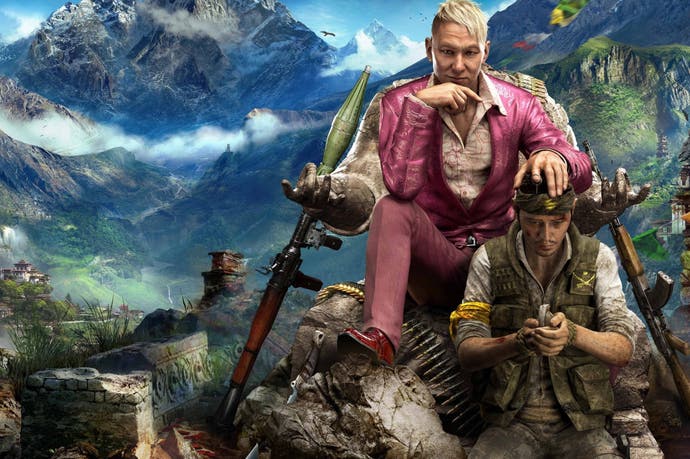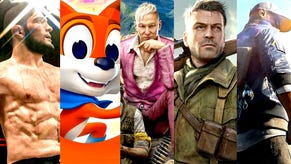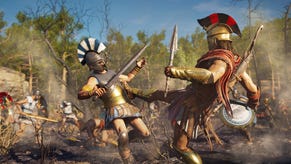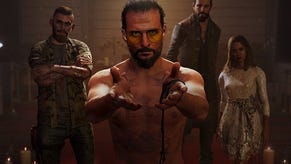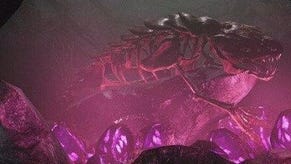Moving targets: the scattergun politics of Far Cry 4
Ubisoft Montreal's latest could be a fine portrayal of a country under siege, if only it stopped to breathe.
Somebody has left the radio on. As I swerve the truck through the outpost gate, into the precarious wiggles of Kyrat's infrastructure, Royal Army trumpets blare from the radio, obscuring cries about this great nation, these meddling anarchists. It's tempting to toggle auto-drive, settle back and gloat over the cracks in the rhetoric, as the regime labours to play down my recent conquests - fully half of the realm's radio masts mounted and flipped to the rebel cause. But there is, as ever with Far Cry 4, no time. I'm already out of the car, slicing through the underbrush.
In a clearing nearby, three boys in red vests are rigging a statue of the Buddha with explosives. They're dead before I can catch my breath. One soldier gapes for a second at the Kukri protruding from his rib cage; another falls silently to a throwing knife. My magnum springs up and guns down the third, launching him violently into the air. Purple "karma" dutifully suffuses the top of the HUD. I have enough of it now to summon a mercenary to sully his conscience on my behalf. The real Buddha probably wouldn't approve, but his in-game manifestation only beams complacently, spared the fate of its real-world fellows in Tibet, where thousands of monasteries and convents have been destroyed since China overran the country in 1950.
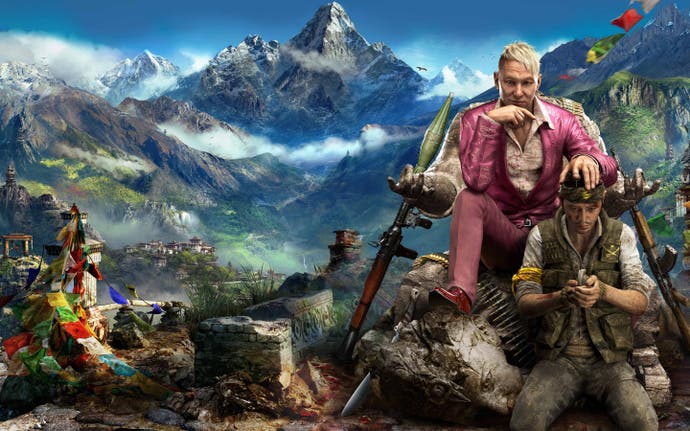
Vaguely entranced by the dappled stone, I take a step towards it and my phone rings. It's Pagan Min, Kyrat's shameless old gossip of a despot. He's eager for my thoughts on the tug-of-war between my lieutenants in the Golden Path resistance group, between Sabal's suffocating adherence to the old ways and Amita's hunger for emancipation by fair means or foul - but there is still, for some reason, no time. A courier zips by on a quadbike, his pockets stuffed with intel I'll pass on to Amita without reading; gunfire bubbles up from behind a ridge, like beckoning applause; an untouched radio tower blinks in the distance, casting its glamour of propaganda. There is never enough time, somehow, for everything there is to do at any given moment in this game.
You don't explore Far Cry 4's Kyrat, really. You fall endlessly through it, pulled under by the magnets that hum behind its rusty evergreen verdure, weary masonry and yawning Himalayan backdrop. Like a champion matador, Ubisoft Montreal's latest adventure leads the player by the nose without ever letting the player in on the act. Eschewing narrative direction for the most part, it whirls you effortlessly from one anecdote-friendly encounter to the next by way of subtly colour-coded furnishings, carefully gauged sightlines, audio cues, event triggers and artfully strewn vehicles.
It's exhilarating, this smouldering susceptibility to improvisation, where you stumble out at random and are deftly caught and guided to something entertaining. It's also frustrating, because Far Cry 4 is made up of people, events and places that deserve more sustained attention than it teaches you to bestow. The game's flair for momentum and distraction keeps it, and you, from examining and exorcising the demons it conjures - the arms trade, the imprisonment of political opponents, opium wars, the aura of celebrity cultivated by tyrants to bolster their military might, the demolition of local faiths by an occupying force.
Copious lore entries suggest that there's a searching, sophisticated portrayal lying just out of view, a fiction grounded in studio expeditions to Nepal and conversations with the survivors of its civil war. But what social and cultural insights the game has to share are tangled up, mangled by the perpetual motion machine that is Kyrat. Far Cry 4's strength and weakness is that it rarely lets you stop to think.
The game's insatiable thirst for pace calls to mind the portrait of a fully mechanised military complex offered by the journalist Michael Herr, who worked as an embedded correspondent during the Vietnam War. Far Cry has never tried its hand at Vietnam directly - as with Sledgehammer's canned third-person Call of Duty, it's possible that the subject is too divisive outside the USA for Ubisoft's liking - but from the second game onwards, it has avidly courted comparison with the conflict's manifestations in cinema.
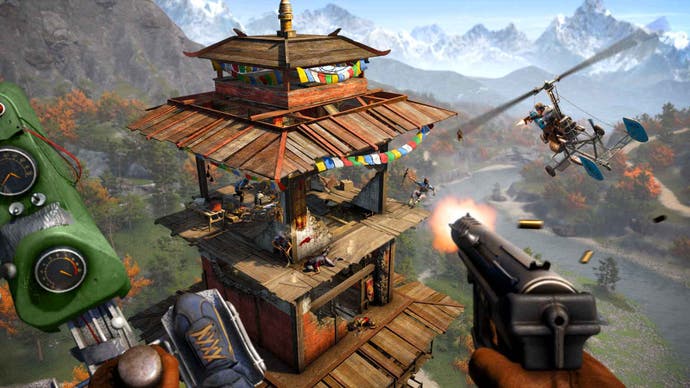
Herr - who co-wrote Full Metal Jacket and contributed to Apocalypse Now and Platoon - explains in his memoir Dispatches that the experience of the war was distinguished by nigh-miraculous advances in transport technology and logistics, as the US sought to counter the Viet Cong's guerrilla tactics by deploying helicopters, the ultimate fast-travel option, to ferry infantry rapidly around a molten frontline. Apocalypse Now's infamous Wagner-abetted beach raid is a raucous celebration of this. I'll admit to trying to recreate it in Far Cry 4, with the aid of a gyrocopter, Molotov cocktails and a preternaturally patient co-op partner.
"Except for the rare times when you were pinned or stranded the system was geared to keep you mobile, if that was what you thought you wanted," Herr observes, adding elsewhere that "our machine was devastating. And versatile. It could do everything but stop." Far Cry 4 is another unstoppable machine, and the price in Herr's terms is the same - an addled blindness to the bigger picture, to the chains of cause and effect that extend beyond the adrenaline spasms of the present tense. "Some of us moved around the war like crazy people until we couldn't see which way the run was even taking us anymore," he goes on. "Only the war all over its surface with occasional, unexpected penetration."
To Far Cry 4's credit, it does challenge its own ethic of free-flowing movement in the form of an alternative ending, unlocked by lingering over lunch during your first brush with Pagan Min, rather than setting off at once to join the rebels. This short-circuits around 20 hours of mayhem, taking you straight to the final revelations about your character's family and their dealings with Min. Clever stuff - but the sequence also implies that the alternative to rebounding through turmoil and tragedy like a punctured gas cylinder is to wash your hands of it all. You can either engage on the game's resolutely hyperactive terms, or you can jump to the credits reel, which isn't much of a choice. And in any case, the scene concludes with the prospect of being able to run amok as Min's ally, nudging you back in the direction of Kyrat and its turbulent fecundity.
This is perfectly consistent behaviour for Ajay Ghale, a tissue-thin, nebulous protagonist born of a wish not to interfere with the narratives that ignite where player and world collide. As creative director Alex Hutchinson put it to Eurogamer in June, "the best story in Far Cry is the story you tell yourself, and finding ways to get out of the way of that is kind of the goal." Ghale is accordingly much less of a presence than the third game's squealing fratboy Jason Brody, which supposedly means you're free to project your own particular brand of politics onto him - a receptiveness to interpretation that feeds into branching plot paths. Are you a filthy patriarch, like Sabal, a brutal pragmatist like Amita, or a theatrical troll like Pagan Min?
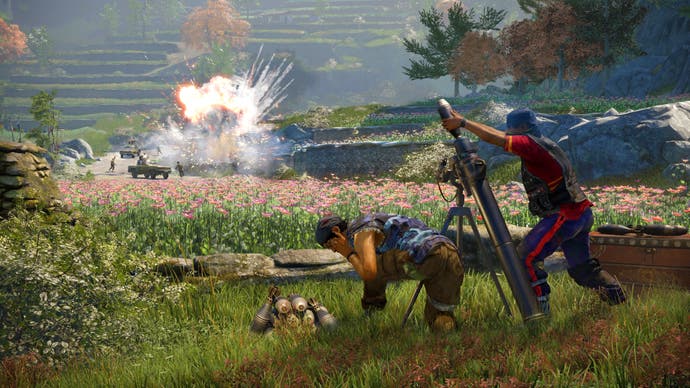
The problem with this approach is that Ubisoft Montreal doesn't go the whole hog. Unlike, say, Skyrim's Dragonborn, Ghale is still a pre-defined character - he's a native son of Kyrat, raised in the US, who returns to the country to scatter his mother's ashes. It's a relatively unusual and fascinating premise that might have been the basis for truly stirring writing.
Mourning can be a powerful form of political activism, as recent terrible events in Ferguson, Missouri remind us, and the game's script teeters on the edge of seriously exploring this: assuming you don't side with Min, the campaign boils down to reshaping society as one or other of your parents would have wished. But that pressure to sandpaper the immersion curve, to keep Ghale out from under the player's feet, makes it too easy to reduce his input to the corpses in your wake, the tricked-out weapon lounging faithfully under your nose, the guards loitering with their backs turned a little further down the road. If this is "self-expression", it's a sadly meagre and stunted interpretation of the concept.
Ghale's mixed heritage is also an effort to dodge one of the franchise's recurring criticisms: that Ubisoft has constructed a "civilised" man's power fantasy of intervention, in which an empowered Western war-tourist casually rewrites the rules of a "failed" nation state. It's an accusation Ubisoft Montreal is at pains to address elsewhere. In a further indication that the writing might have achieved more than the acceleration-prone design framework allows for, many of the other characters are overt nods to the hypocrisy that is an outsider seeking to save a country while treating it as a firing range for the latest ballistics hardware.
There's Paul de Pleur, a cosily all-American family man who leads a double life as a sex trafficker and torturer, and CIA agent Willis Huntley, an absurd, racist peacock in furs and Aviator shades. Their sides of the story are over in a flash, however, and they float atop a familiar set of metaphors about the supernatural potency of "exotic", "ethnic" cultures. Far Cry 3 had its tattoo system, whereby you'd channel the power of the Magic Negro in the form of unlockable executions and stat buffs. Far Cry 4 has "Karma", a crudely functional re-imagining of the Buddhist idea that every deed has a spiritual residue. Among the earthly pay-offs, apparently, is a discount on your next assault rifle.
The game also takes players to Shangri-La, a blood-on-marble recreation of the temporal paradise that's held to exist somewhere in northern Tibet. The realm's gigantic prayer bells, leafy shrines and emaciated demon invaders are clearly the result of much research, but Shangri-La is as much a westerner's fantasy as a Tibetan one: it's an Orientalist co-opting of the Hindu and Buddhist fable of Shambhala, popularised overseas by the British adventure novelist James Hilton in 1933. Seeking to pump up tourist revenues, the Chinese regime renamed Zhongdian County "Shangri-La County" in 2001. In settling on the fabled realm as a sort of stylistic refresh, Ubisoft Montreal seems to have made much the same commercial calculation.
Such calculations are often made with the best of intentions, of course. If Far Cry 4 fails as a portrayal, it's nonetheless a game that tries to do right by its inspirations. Spurred by the scandal of the game's announcement, in which Pagan Min was introduced with his feet resting blasphemously on a shorn-off stone Buddha's head, producers, writers and designers have spoken, time and again, of their desire not to misrepresent the places and incidents on which they draw. This was to be achieved by merging influences to create a free-flowing, familiar but unaccountable fantasy, that can't be reduced to the political narratives associated with any of its core elements.
The problem is that the act of chiselling cultures apart and stitching the pieces together is itself presumptuous - that's the kind of thinking that gave us Disney World - and Far Cry 4's success as a fluidly unspooling action extravaganza means that the world's components don't have room to breathe. As a platform for political statement, the experience is ultimately that of haphazardly surfing broadcasts on a car radio while the vehicle careens through dense woodland. You emerge from the game's coils blissed-out and enthralled, nerves singing like harp strings, but also unenlightened and a little outraged.
